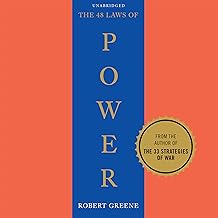
How to Read Robert Greene's Books on Strategy
How to Read Robert Greene's Books on Strategy
Estimated Reading Time: 10-12 minutes
Introduction
Robert Greene is a contemporary author renowned for his incisive explorations of power, strategy, and human behavior. Born in 1966 in Los Angeles, Greene's diverse background—ranging from classical studies to a career in Hollywood—has significantly influenced his writing style and thematic focus. His works, particularly "The 33 Strategies of War" and "The 48 Laws of Power," delve into the complexities of human relationships and the often ruthless tactics employed in the pursuit of success.
Greene's perspective on strategy is unique because it synthesizes historical anecdotes, philosophical insights, and psychological principles, presenting a comprehensive guide to navigating the intricacies of power dynamics. His writings resonate in a world where personal and professional conflicts are ubiquitous, making his insights not only relevant but essential for anyone looking to enhance their strategic thinking.
Why Robert Greene's Perspective Matters
What sets Robert Greene apart from other strategists and thinkers is his ability to distill complex ideas into accessible, actionable insights. Unlike traditional military strategists who may focus solely on battlefield tactics, Greene examines the broader implications of strategy in everyday life, emphasizing the psychological underpinnings of human behavior. His work draws from a wide array of historical figures—from Sun Tzu to Machiavelli—allowing readers to see how timeless principles can be applied to modern contexts.
Greene's contributions have had a lasting impact on various fields, including business, politics, and personal development. By understanding the mechanisms of power and strategy, readers can better navigate their own lives, making informed decisions that lead to success.
Overview of Recommended Books
The 33 Strategies of War
"The 33 Strategies of War" is a masterful synthesis of military strategy and practical wisdom. Greene organizes the book into five distinct sections, each addressing different aspects of strategy:
- Self-Directed Warfare: Focuses on mastering your own mind and emotions.
- Organizational (Team) Warfare: Explores how to effectively lead and manage teams.
- Defensive Warfare: Offers insights into protecting oneself from adversaries.
- Offensive Warfare: Discusses proactive strategies for gaining the upper hand.
- Unpredictable Warfare: Emphasizes the importance of adaptability and surprise.
Key Insights:
- Know Your Enemy: Understanding your adversary's motivations and weaknesses can provide a significant advantage.
- Create a Sense of Urgency: Instilling urgency in your team can lead to increased productivity and focus.
- Use Decoys and Misdirection: Sometimes, the best strategy is to mislead your opponents, creating opportunities for unexpected maneuvers.
- Be Unpredictable: Keeping your opponents guessing can prevent them from effectively countering your strategies.
Why Read This Book: "The 33 Strategies of War" is essential for anyone interested in understanding the principles of strategy beyond military applications. It is particularly beneficial for leaders, entrepreneurs, and individuals seeking personal growth. The book's emphasis on psychological tactics and historical examples makes it a rich resource for comprehending the nuances of conflict and competition.
The 48 Laws of Power
In "The 48 Laws of Power," Greene distills centuries of historical wisdom into 48 essential principles that govern the dynamics of power. Each law is illustrated with historical anecdotes, making the lessons both engaging and memorable. The laws range from the pragmatic, such as "Conceal Your Intentions," to the more philosophical, like "Play to People’s Fantasies."
Key Insights:
- Never Outshine the Master: Ensuring that those above you feel secure in their position can lead to greater opportunities for yourself.
- Make Others Depend on You: Creating a sense of dependency can secure your position and influence.
- Always Say Less Than Necessary: The more you say, the more common you appear; silence can be a powerful tool.
- Win Through Your Actions, Never Through Argument: Demonstrating your capabilities through actions rather than words can yield more significant results.
Why Read This Book: "The 48 Laws of Power" is a provocative exploration of human behavior and social dynamics. It is particularly valuable for professionals in competitive environments, individuals in leadership roles, and anyone interested in the intricacies of influence. Greene's candid approach to power dynamics encourages readers to reflect on their own strategies in personal and professional contexts.
How These Books Complement Each Other
While "The 33 Strategies of War" focuses on the tactical aspects of conflict and competition, "The 48 Laws of Power" delves into the psychological and social dimensions of power. Together, they provide a comprehensive framework for understanding strategy in various contexts.
- Building a Foundation: "The 33 Strategies of War" offers foundational strategies that can be applied in many situations, while "The 48 Laws of Power" provides deeper insights into the motivations and behaviors of individuals in power dynamics.
- Practical Applications: Both books emphasize the importance of adaptability and strategic thinking, encouraging readers to apply these principles in their daily lives.
- Holistic Understanding: Reading both works allows for a more nuanced understanding of strategy, blending tactical prowess with psychological insight.
Who Would Benefit from Reading These Books
These books are ideal for a diverse audience, including:
- Students and Academics: Those studying history, psychology, or business can gain valuable insights into the nature of power and strategy.
- General Readers Interested in Strategy: Anyone curious about the dynamics of human behavior and competition will find these works enlightening.
- Professionals Seeking Practical Wisdom: Leaders, managers, and entrepreneurs can apply Greene's principles to enhance their effectiveness in competitive environments.
- Anyone Looking for Personal Growth and Self-Improvement: Readers interested in self-development will find actionable strategies to navigate their personal and professional lives.
Recommended Reading Order
- Start with: The 48 Laws of Power - This book lays the groundwork for understanding the dynamics of power and influence, providing a broad overview of Greene's philosophy.
- Continue with: The 33 Strategies of War - After grasping the principles of power, this book offers practical strategies that can be applied to various conflicts and challenges.
- Advanced reading: Explore Greene's other works, such as "The Art of Seduction" and "Mastery," to deepen your understanding of human behavior and strategy.
Tips for Getting the Most Out of Each Book:
- Take notes on key insights and how they apply to your life.
- Reflect on historical examples and consider how they relate to contemporary situations.
- Discuss the concepts with others to enhance your understanding and application.
Conclusion
Robert Greene's contributions to the understanding of strategy are invaluable. His works provide a rich tapestry of insights that blend historical context with practical wisdom, making them essential reading for anyone interested in the dynamics of power and human behavior. By exploring "The 33 Strategies of War" and "The 48 Laws of Power," readers can equip themselves with the tools necessary to navigate the complexities of life and achieve their goals.
As you embark on this journey through Greene's works, remember that the principles of strategy are timeless and applicable across various domains. Dive into these texts, reflect on their teachings, and apply them to your own life for personal and professional growth.
Tags: #RobertGreene #Strategy #Philosophy #ReadingGuide #ClassicLiterature #Wisdom
Featured Books

The 33 Strategies of War
by Robert Greene
Published: 2001
Brilliant distillations of the strategies of war—and the subtle social game of everyday life—by the bestselling author of The 48 Laws of Power and The Laws of Human Nature. This is the only authorized paperback edition in the US. Robert Greene’s groundbreaking guides, The 48 Laws of Power, The Art of Seduction, and Mastery, espouse profound, timeless lessons from the events of history to help readers vanquish an enemy, ensnare an unsuspecting victim, or become the greatest in your field. In The 33 Strategies of War, Greene has crafted an important addition to this ruthless and unique series.Spanning world civilizations, synthesizing dozens of political, philosophical, and religious texts and thousands of years of violent conflict, The 33 Strategies of War is the I-Ching of conflict, the contemporary companion to Sun Tzu’s The Art of War.Abundantly illustrated with examples from history, including the folly and genius of everyone from Napoleon to Margaret Thatcher, Shaka the Zulu to Lord Nelson, Hannibal to Ulysses S. Grant, as well as movie moguls, Samurai swordsmen, and diplomats, each of the thirty-three chapters outlines a strategy that will help you win life’s wars. Learn the offensive strategies that require you to maintain the initiative and negotiate from a position of strength, or the defensive strategies designed to help you respond to dangerous situations and avoid unwinnable wars. The great warriors of battlefields and drawing rooms alike demonstrate prudence, agility, balance, and calm, and a keen understanding that the rational, resourceful, and intuitive always defeat the panicked, the uncreative, and the stupid. An indispensable book, The 33 Strategies of War provides all the psychological ammunition you need to overcome patterns of failure and forever gain the upper hand. Read more

The 48 Laws of Power
by Robert Greene
Published: 1998
Amoral, cunning, ruthless, and instructive, this multi-million-copy New York Times bestseller is the definitive manual for anyone interested in gaining, observing, or defending against ultimate control – from the author of The Laws of Human Nature. This is the only authorized paperback edition in the US. In the book that People magazine proclaimed “beguiling” and “fascinating,” Robert Greene and Joost Elffers have distilled three thousand years of the history of power into 48 essential laws by drawing from the philosophies of Machiavelli, Sun Tzu, and Carl Von Clausewitz and also from the lives of figures ranging from Henry Kissinger to P.T. Barnum. Some laws teach the need for prudence (“Law 1: Never Outshine the Master”), others teach the value of confidence (“Law 28: Enter Action with Boldness”), and many recommend absolute self-preservation (“Law 15: Crush Your Enemy Totally”). Every law, though, has one thing in common: an interest in total domination. In a bold and arresting two-color package, The 48 Laws of Power is ideal whether your aim is conquest, self-defense, or simply to understand the rules of the game. Read more